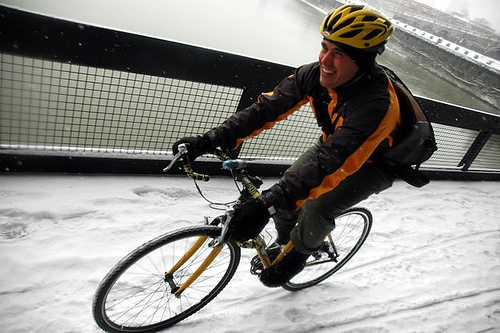Here’s the bike news from around the world that caught our eyes this week:
Winter riding: It’s possible that today’s the end of this winter’s coldest snap, but it’s not too late to become a winter biking expert.
Happiness machines: The many benefits of bikes include slowing the aging of skin, getting you to sleep promptly and separating you from air pollution compared to car use.
Syrian freedom: “Bike sales are exploding” in Damascus, as Syrians “have turned to bikes en masse to avoid the endless traffic jams caused by hundreds of army checkpoints.”
Lawsuit specialists: “A Canadian veteran of the Afghanistan war who operates a tiny bicycle shop in Cochrane is being forced to change his store’s name after being threatened with a lawsuit” from bike manufacturer Specialized, which claims it has trademarked the name “Roubaix” for one of its bikes. (It’s a region in France that’s home to a famous bicycle race.) As we reported in 2006 and 2010, Specialized seems to do this sort of thing regularly.
Bike share placemaking: In NYC, Citi Bike stations are providing more than just transportation. People are using them for on-street public seating, rendezvous points and interaction hubs, all from “the space that would have otherwise been used to store a couple of empty cars.”
Banning exercise: Two cities named Charlotte are protecting their children by banning from city streets dangerous activities such as playing basketball or riding bicycles.
Total safety: The almost daily drumbeat of road deaths has convinced a TV anchor in New York City that Vision Zero, a policy that aims to use road design to eliminate them, is “a fight worth having.”
Suburban calm: The “safest suburb in the world” got that way by building “two separate transportation networks.” The city of 44,000 suffered exactly one traffic fatality between 2001 and 2005.
Gas tax hike: U.S. Rep. Earl Blumenauer (D-Portland) wants to add 15 cents per gallon to repair roads and build new infrastructure. It’d be the first such increase in 20 years, during which time the market price of a gallon has risen $2.20.
Car-centric London: London’s lack of separated bike infrastructure is “laughable,” says the celebrated Copenhagen architect Jan Gehl, and therefore its bike share system isn’t safe.
License requirements: A British driver’s license is “basically a Ph.D. in driving,” while American driving tests are “a joke,” writes an American in England.
Harmful protest? Londoners’ hugely successful protest for bike safety risks “creating a climate in which the public believe that cycling is becoming ever more dangerous in London,” even though the city’s fatality rate keeps falling. The demonstrations “could actually be making cycling less safe in London.”
Copenhagen backlash: “‘Bully cyclists’ have created an atmosphere of fear and intimidation for people on foot,” according to the chairman of the Danish Pedestrian Association. (That didn’t stop a pro-bike candidate from winning a local election for last month for “traffic mayor,” though.)
Safety gap: People on bikes and foot account for 15% of annual average U.S. traffic deaths, a recent study found. In car-bike collisions, people were using bikes legally 89% of the time and people in cars are at fault 87% of the time.
Electric hybrid: Is it a bicycle? Is it a motorbike? Something in between, according to Bruno Greppi, the co-founder of Cykno.
E-bike ban: NYC’s government is in hot water over a new law banning the use of electric bikes by businesses or their employees.
Street grid science: On Strongtowns.org, Andrew Price looks closely — very closely — at six different street grid patterns, including Portland’s, and offers revealing insights about the cities each one creates.
Black Friday parking: “If you want to build a strong town, get rid of your parking minimums,” writes Chuck Marohn in a photo essay ridiculing the amount of land devoted to auto parking that’s useful on one day every year. “Any chaos that ensues will be healthier for your city than the acres of unproductive, wasted space we have justified with a veneer of professional expertise.”
Pro-bike smackdown: “Just as it would be inefficient to force travelers to walk or bike for trips most efficiently made by motorized modes, it is inefficient and unfair to force travelers to drive for trips most efficiently made by active modes,” writes Todd Litman in a total demolition of most arguments in favor of car-dependent cities. I especially like his calculation that building Portland’s 2030 bike plan would cost “$6 to $25 annually per capita, a small fraction of the approximately $665 per capita spent annually on roadways.”
Cargo bikes: It’s the Associated Press’s turn to notice that these are a thing.
Driverless car horrors: The national passenger rail lobby grasps for every possible argument against driverless cars, including reduced automaker profits and increased obesity, without bothering to consider the effects of reduced car ownership.
Outrage shortage: Last week’s awful New York train derailment that killed four, injured 60 and got wall-to-wall news coverage and investigative resources was dwarfed by the little-noticed death toll of local street systems.
Indoor parking: Bike theft is a significant barrier to biking, and the infrastructure that fixes it is secure indoor parking, says newspaper coverage from Vancouver BC.
Biking gadgets: Laser-projected bike lights, snap-on electric assists, airbag-style helmets: all part of a boom in cool bike gadgets, but maybe a “distraction” from the supposed need for “hard segregation” to improve safety.
Easy e-bike: The 12-pound, $700 Copenhagen Wheel, which snaps into your rear dropout and gives your bike a smartphone-connected electric assist, is now on sale, and it’s worth a couple minutes as your video of the week:
If you come across a noteworthy bicycle story, send it in via email, Tweet @bikeportland, or whatever else and we’ll consider adding it to next Monday’s roundup.


